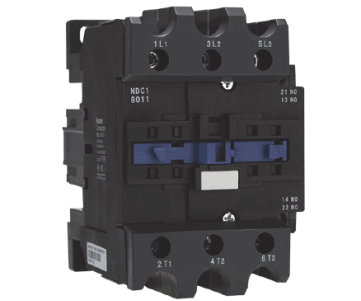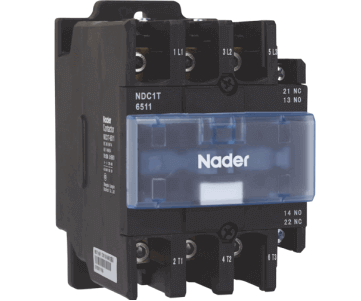1. What is a contactor?
A contactor is an electrically-controlled switch used for switching an electrical power circuit. Differ from general-purpose relays, contactors are designed to be directly connected to high-current load devices. Relays tend to be of lower capacity and are usually designed for both normally closed and normally open applications. Contactors are designed with features to control and suppress the arc produced when interrupting heavy motor currents.
2. What is the difference between contactor and relay?
Contactors and relays are two closely related, both of them are electrically operated switches used for control and switching of loads.
Contactors and relays have similar construction. Both have an external envelope to protect all the internal parts from the external environment. An electromagnetic coil is provided for opening and closing of contacts. The contacts are opened and closed by exciting this electromagnetic coil.
A Contactor is used for switching of motors, capacitors, lights etc, that drains very high current. It has at least a single pair of three phase input and output contacts. Contactors can carry with additional auxiliary contacts that may be either NO or NC. Switching is achieved by energization and De-energization of the contactor coils. Contactors are chosen upon the ampere ratings of the load. Contactors require an additional supply (either AC or DC depending upon the type of contactor we use) for excitation. It is used for power switching.
A relay consists of at least two contacts and an excitation coil. These contacts may be normally open or normally closed. These contacts are closed or opened by exciting the coil. Relays are used for switching of control circuits and cannot be used for power switching with relatively higher amp.
3. What is a Contactor Components?
Coil or Electromagnet: This is the most crucial component of a contactor. The driving force that is required to close the contacts is provided by the coil or electromagnet of the contactor. The coil or electromagnet and contacts are protected by an enclosure.
Contacts: Task of on or off is done by the contacts. There are different types of contacts main contacts, auxiliary contacts. Each type of contact has an individual role to play.
Enclosure: Contactors also feature an enclosure, which provides insulation and protection from personnel touching the contacts. The protective enclosure is made from polycarbonate, polyester, Nylon 6, Bakelite, or thermosetting plastics.
4. Why contactors are used?
When a relay is used to switch a large amount of electrical power through its contacts, it is defined by a special name: contactor or name contactor relay. Contactors typically have multiple contacts, and those contacts are usually normally-open, so that power to the load is shut off when the coil is de-energized. So the most common industrial use for contactors is the control of motors.
5. How many types of contactors are there?
Contactors come in many forms with varying capacities and features. Differ form a circuit breaker, a contactor is not intended to interrupt a short circuit current. Contactors range from those having a breaking current of several amperes, for example, 25A, 32A, 40A, 50A, to thousands of amperes and several V to many kilovolts. We select contactor according to motor's participation. On the other side, The physical size of contactors ranges from a device small enough to pick up with one hand, to large devices approximately many meter on a side.
6. What is the difference between AC contactor and DC contactor?
The main different is the arc extinguishing devices. AC contactor adopts a grid arc extinguishing device while the DC contactor adopts a magnetic quenching arc extinguishing device. AC contactor has a large starting currents, its maximum operation frequency is about 600 times an hour, while that of DC contactor can be 1200 times an hour.
7. How do you use electrical contactors?
A contactor is an electrically-controlled switch used for switching an electrical power circuit. A contactor is typically controlled by a circuit which has a much lower power level than the switched circuit, for example we can use a 24-volt coil electromagnet to control a 230-volt motor switch.
8. Why contactor is used?
A contactor is a large relay, usually used to switch current to an electric motor or another high-power load. Large electric motors can be protected from over current damage through the use of overload heaters and overload contacts.
Recommended article:

